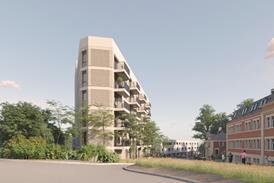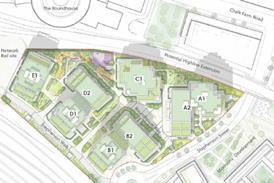Our adversarial planning system is undermined by the unequal strength of the opposing armies, says David Rudlin

The motion at the Academy of Urbanism’s spring debate was: “This house believes that the English planning system is not fit for purpose”.
Speaking for the motion (and therefore against the planning system – yes, that got confusing as the evening proceeded) – was Nick Raynsford, author of the Raynsford Review into the future of planning, which I have written about in a previous column. He was seconded by Roger Smith of Savills and opposed by Jennifer Ross of Tibbalds and Matt Thompson of CPRE.
The reality was that no one really felt able to defend the system we have. The debate was between those who thought it was fatally flawed and those who believed it was essentially sound but has been ruined. Take your pick. Neither is very encouraging.
The defenders of the system argued that much of the way we do things in the UK is based on having a really good argument. This is how our legal system works, with two sets of lawyers arguing for the prosecution and the defence in the – generally well-founded belief – that the truth will emerge. Our political system, lined up a sword’s length apart across the House of Commons, is based on a similar principle (although maybe now is not the time to hold that up as a good example).
The planning system works in the same way. Unlike continental systems, most of our planning policy is discretionary. Policies are written but they can be challenged by developers and interpreted by planning authorities. There is public consultation at every stage of the process and the eventual decision is political, although this is subject to appeal and the quasi-judicial process of a public enquiry. The assumption is that the outcome forged through this argumentative process will be the right one.
The most telling point made over and over again during the debate was that this is clearly not the case. However much you may defend the process, virtually no one thinks the outcome is the best it could be.
>> Also read: When it comes to planning, we’ve painted ourselves into a corner
Before even considering design, we must face the fact that we are not achieving the housing numbers we need and are allowing the scandal of permitted development conversions of offices to sub-standard flats. Everyone is left unhappy and dissatisfied (with the possible exception of planning consultants and lawyers).
The last point was brought home to me following a piece I had published this month in Guardian Cities where I tried to make a similar argument. My central point was that most of the places we have created since the foundation of the modern planning system in 1947 have been “crap”.
I stress that I’m not a traditionalist: I love contemporary architecture as much as the next person. But the product of the planning system has been the cul-de-sac-based suburb, the ring road, the retail park and industrial estate, not the sort of human-scaled, mixed-use walkable places that we mostly quite like.
Across social media there have so far been more than 1,000 comments on the piece, most from people not involved in the built environment (although there was a slightly sniffy one from the RTPI). It’s quite bruising reading many of these comments – and yes I do understand that many people really like cul-de-sacs! But without being scientific I would say that more than half of the responses agreed with my central point. We must judge the planning system by what it produces, and on that basis it fails.
The problem with an argument-based system is that it fails if one side is under-resourced. This is why the legal system has, or should have, legal aid.
The problem with planning is that planning authorities have one hand tied behind their back, starved of resources and staff and fighting rear-guard actions against a development industry poised to pounce on any misstep they might make.
My personal view is the system is not fit for purpose and needs to be rethought from first principles, even though this would take some time. In the meantime if we are going to make the system we have work we need to value, respect and properly resource it.
















1 Readers' comment